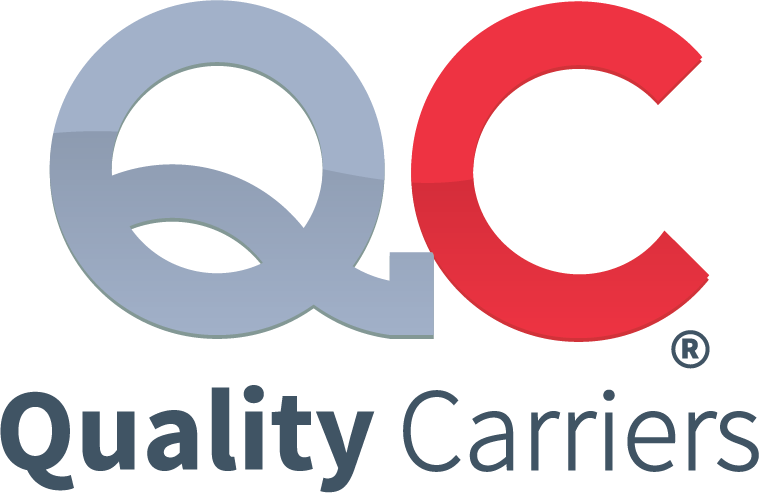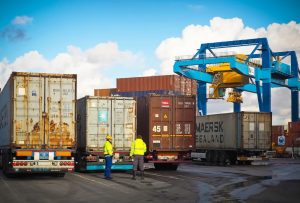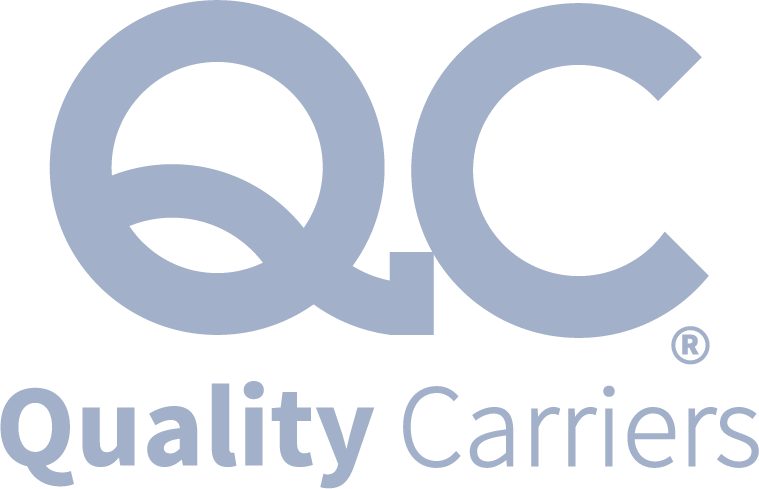Navigating the highways of the transportation industry, the term “owner-operator” emerges as a distinctive force. But what exactly lies behind this title? The realm of owner-operators is a dynamic and essential component within trucking, encompassing a unique set of responsibilities, benefits, and challenges. This blog seeks to illuminate the concept of an owner-operator, delving into their role, significance, and the multifaceted journey that defines their existence in the trucking world.
What does it mean to be an owner-operator?
An owner-operator is a professional truck driver who takes on a dual role as both the operator of their commercial vehicle and the owner of their small trucking business. In this unique arrangement, an owner-operator operates the truck on the road and manages various aspects of their business, ranging from client interactions and contract negotiations to financial management and equipment maintenance.
Owner-operator’s responsibilities extend beyond driving. They are accountable for maintaining their vehicle’s condition, handling repairs, managing fuel efficiency, and adhering to regulatory requirements. Additionally, owner-operators are tasked with administrative duties such as managing contracts, tracking expenses, invoicing clients, and handling paperwork related to freight transportation.
The benefits of being an owner-operator are multifaceted. Financially, owner-operators have the potential to earn a larger share of the revenue compared to company drivers. They can set their rates and negotiate contracts based on their understanding of the market and their costs. Moreover, owner-operators have flexibility in choosing loads, routes, and working hours, which can contribute to a better work-life balance.
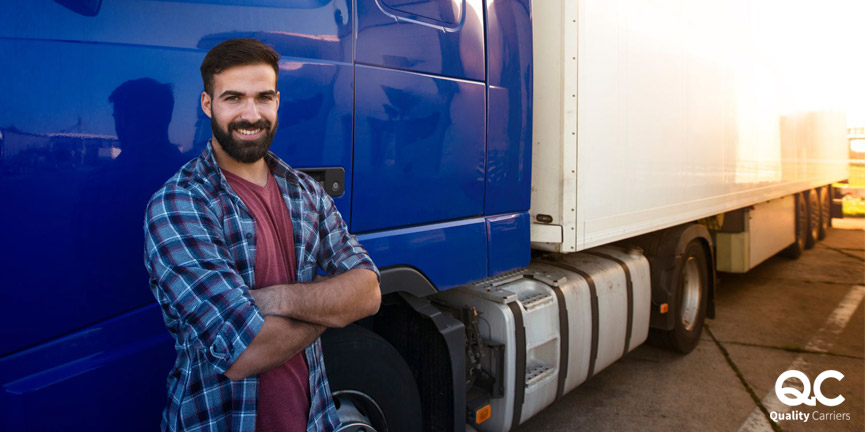
What are the requirements for becoming an owner-operator?
To become an owner-operator, certain essential prerequisites must be met. These requirements ensure that you have the qualifications and credentials to take on the dual roles of a truck driver and a business owner. Here are the core requirements for becoming an owner-operator:
Commercial Driver’s License (CDL): A Commercial Driver’s License is a fundamental requirement for anyone operating a commercial vehicle. It demonstrates your proficiency in handling larger vehicles and adhering to the safety regulations associated with commercial driving. The specific class of CDL you need depends on the type of vehicle you plan to operate.
USDOT Number: The United States Department of Transportation (USDOT) number is essential for carriers engaging in interstate commerce. It is a unique identifier that helps monitor a carrier’s safety information and compliance with federal regulations. This number is crucial for owner-operators transporting goods across state lines.
Motor Carrier (MC) Number: Alongside the USDOT number, an owner-operator may also need a Motor Carrier (MC) number, especially if they engage in interstate commerce. This number further establishes your status as a carrier authorized to transport goods across state lines.
Insurance: Adequate insurance coverage is imperative for anyone operating commercial vehicles. Owner-operators need insurance that covers their truck, cargo, and potential liabilities. Liability insurance, cargo insurance, and physical damage coverage are essential to ensure protection in case of accidents, damage, or loss.
What Does an Owner Operator Do?
An owner-operator is an individual who takes on the combined roles of a skilled truck driver and a small business owner in the transportation industry. Beyond driving, owner-operators manage various aspects of their operations, including negotiating contracts, pricing services, and handling administrative tasks. They are responsible for the maintenance and upkeep of their commercial vehicles, ensuring safe and efficient transportation. Route planning, load management, compliance with regulations, customer interactions, bookkeeping, and emergency preparedness are all integral parts of their responsibilities. This multifaceted role demands driving expertise, business acumen, and adaptability as owner-operators navigate transportation complexities while overseeing their independent trucking businesses.
Owner-operator vs. company truck driver
The trucking industry offers two distinct career paths: an owner-operator trucker
and a company truck driver. These roles represent different approaches to the profession, each with benefits, challenges, and responsibilities.
Key Differences
Ownership and Autonomy: The primary distinction lies in ownership and autonomy. Owner-operators have their own business and equipment, giving them greater independence in decision-making, while company drivers operate under the guidance of their employers.
Financial Considerations: Owner-operators have the potential for higher earnings but bear more financial responsibility for expenses. Company drivers receive consistent pay but may need more control over their income potential.
Operational Control: Owner-operators can select routes, types of cargo, and pricing based on market insights. Company drivers adhere to company-set schedules and routes.
Risk and Responsibility: Owner-operators take on the risks and rewards of entrepreneurship, while company drivers enjoy employment stability without the same financial risks.
Administrative Tasks: Owner-operators handle administrative tasks such as contracts, invoicing, and maintenance management. Company drivers typically have fewer administrative responsibilities.
An owner-operator is a versatile and entrepreneurial professional who embodies the fusion of a skilled truck driver and a savvy business owner. This dual role requires a unique blend of driving expertise, financial acumen, and administrative skills. Owners enjoy greater autonomy, control over their operations, and potential for higher earnings by taking on the responsibilities of driving and managing their own trucking owner operators business.
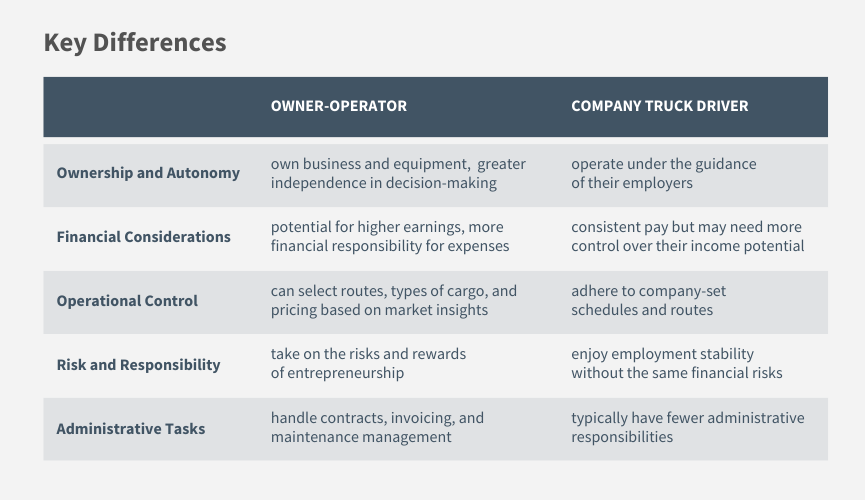
Owner-Operator FAQs
Becoming an owner-operator offers advantages such as increased control over routes and schedules, the potential for higher earnings, and the opportunity to build and manage your own trucking business.
Owner-operators often establish relationships with freight brokers, shippers, and direct clients. They utilize load boards, networking, and online platforms to secure loads that match their equipment and preferences.
Related Blog: How do owner-operators find loads
Owner-operators typically require insurance coverage for their commercial vehicles, cargo, liability, and other potential risks associated with their operations. Insurance ensures protection in case of accidents or damage.
Yes, owning a commercial vehicle is a hallmark of being an owner-operator. You acknowledge, maintain, and operate the truck, allowing for greater autonomy in decision-making.
While owner-operators enjoy autonomy, they bear the business’s costs and risks, such as equipment maintenance expenses and potential income fluctuations due to market changes.
